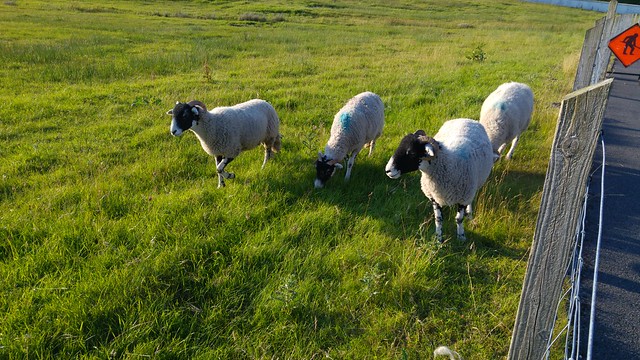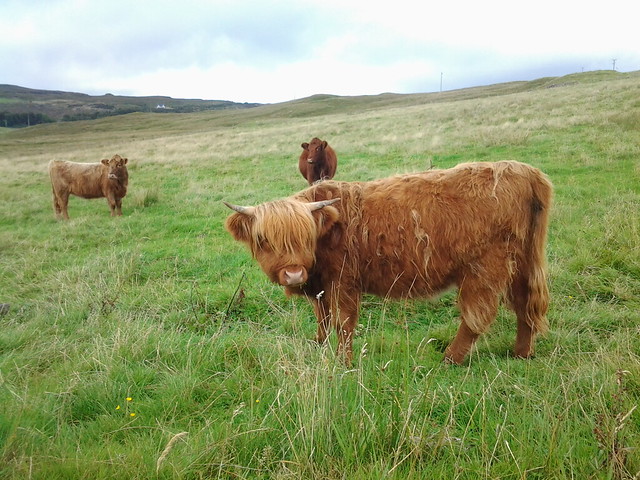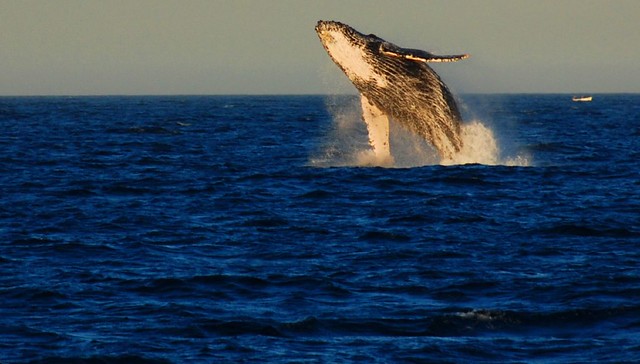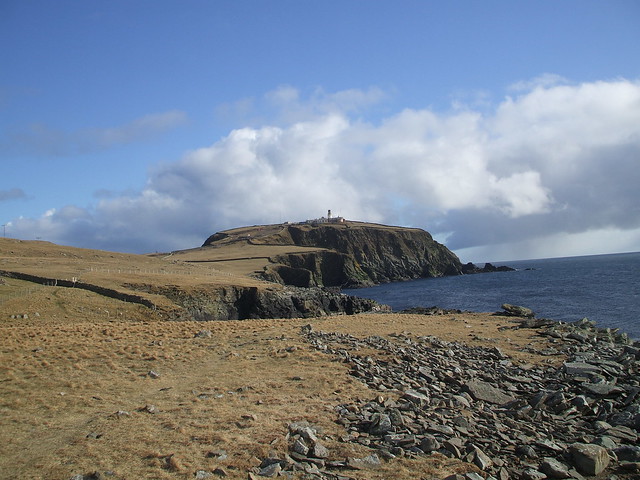Words for pig and related beasts in Celtic languages:
Words marked with a * are reconstructions.
| Proto-Celtic | *mokkus = pig *mokk(w)yatis = swineherd |
|---|---|
| Old Irish (Goídelc) | mucc [muk] = pig, sow; a war engine: a shed to cover sappers muccaid [ˈmukiðʲ] = swineherd muccaidecht [ˈmukiðʲext] = herding swine |
| Middle Irish (Gaoidhealg) | muc, mucc = pig, sow muc(c)ach = pertaining to swine muc(c)aid = swineherd muc(c)aidecht = herding swine muc(c)álach = a brood or litter of pigs muc(c)lach = piggery |
| Irish (Gaeilge) | muc [mˠʊk] = pig; heap, bank, drift; scowl; sow mucachán = (of person) pig, swine mucaire = slovenly worker mucaireacht = slovenly work mucais = pit sty; dirty, slovely person; hogback muicí = swineherd muicíocht = swine-herding |
| Scottish Gaelic (Gàidhlig) | muc [muxɡ] = pig, sow mucag [muxgag] = little pig, piggy, (rose)hip mucaidh = swineherd mucaireachd = swineherding, herding pigs muicfheoil [muçgʲɔl] = pork muc-mhara [muxgˈvarə] = whale muc-stigean = porpoise |
| Manx (Gaelg) | muc = hog, swine, pig, grunter muclagh = piggery, pigsty, sty muick = swine bochilley muickey = swineherd muc hallooin = aardvark muc varrey = whale, porpoise |
| Proto-Brythonic | *mox = pig *möxjad = swineherd |
| Middle Welsh (Kymraec) | moch = pigs, swine mochduy = pigsty mochawg = piggish, swinish meichiat, meicheit, meichad = swineherd |
| Welsh (Cymraeg) | moch [moːχ] = pigs, swine, hogs; greedy, dirty, lazy, drunk, or immoral persons; small pumps used underground in coal-mines to remove water mochyn [ˈmɔχɨ̞n / ˈmoːχɪn] = pig, swine, hog mocha, mochi, mochian = to behave like a pig, wallow, grunt, defile, sully mochach = contemptible or swinish people mochaidd = swinish, filthy, dirty, vile, immoral, greedy mochdra = filthiness, dirtines mochdy = pigsty mochgig = pork, ham, bacon mochog = piggish, swinish mochwr = swineherd, pig-dealer, untidy workman meich(i)ad = swineherd |
| Middle Cornish (Cernewec) | moch, môch = pigs mochyn = pig |
| Cornish (Kernewek) | mogh [mɔːx / moːʰ] = pigs, swine |
| Old Breton | moch = pigs, swine mochiat = swineherd |
| Middle Breton (Brezonec) | moch = pigs, swine |
| Breton (Brezhoneg) | moc’h [moːχ] = pigs, swine moc’haer = swineherd |
Etymology: borrowed from a non-Indo-European substrate language. Words from the same Proto-Celtic root include mocke (a slovenly woman) in Middle Dutch and moche (sow, female pig) in Middle High German [source].
| Old Irish (Goídelc) | cullach [ˈkul͈ax] = boar, stallion muccullach = boar |
|---|---|
| Middle Irish (Gaoidhealg) | cullach, colach = boar, stallion |
| Irish (Gaeilge) | collach [kəˈl̪ˠɑx / ˈkɔl̪ˠəx / ˈkʌl̪ˠax] = boar (male pig); male crab; crude, fleshy, person |
| Scottish Gaelic (Gàidhlig) | cullach = mature male (unneutered) animal (such as boars, hogs, etc) |
| Manx (Gaelg) | collagh = boar, male, stallion collagh muc = boar (domestic) |
| Welsh (Cymraeg) | ceilliog = having testicles, uncastrated, entire, male |
| Middle Breton (Brezonec) | callouch, qalloc’h, calloc’h = entire, standard, stallion |
| Breton (Brezhoneg) | kalloc’h = entire |
Etymology: from Proto-Celtic *kalljo- (testicle).
| Proto-Celtic | *t(w)orkos = boar (pig) |
|---|---|
| Old Irish (Goídelc) | torc [tork] = (wild) boar, chieften, hero |
| Middle Irish (Gaoidhealg) | torc = (wild) boar, chieftan, hero |
| Irish (Gaeilge) | torc [t̪ˠɔɾˠk / t̪ˠʌɾˠk] = (wild) boar, hog; portly, corpulent person, man of substance torcán = little, young boar; small corpulent person torc allta = wild boar torc-chú = boar hound torcshleá = boar-spear |
| Scottish Gaelic (Gàidhlig) | torc = [tɔr̪ˠxg] = boar, hog torc-nimhe, torc-fiadhaich = wild boar |
| Middle Welsh (Kymraec) | tỽrch, twrch, tyrch = hog, (wild) boar, mole |
| Welsh (Cymraeg) | twrch [tʊrχ] = hog, (wild) boar, mole twrch (y) coed = woodlouse twrch daear = mole, badger tyrchu, tyrchio = to burrow, dig (up), root up, nuzzle, rummage; to catch (moles) tyrchaidd = hoglike, hoggish, swinish, greedy tyrchwr, trychydd = mole-catcher, bulldozer |
| Old Cornish | torch = hog |
| Middle Cornish (Cernewc) | torch = hog |
| Cornish (Kernewek) | torgh = hog, boar |
| Old Breton | torch = boar |
| Middle Breton (Brezonec) | tourch = boar, ram; a debauched man |
| Breton (Brezhoneg) | tourc’h = boar, macho, debauched |
Etymology: from the Proto-Indo-European *twerḱ- (to cut) [source]. English words from the same PIE root include trunk, truculent and sarcasm [source].
| Proto-Celtic | *sukkos = pig |
|---|---|
| Old Irish (Goídelc) | socc = pig, sow |
| Middle Irish (Gaoidhealg) | suic, socc, soc = snout, ploughshare |
| Irish (Gaeilge) | soc [sˠɔk] = sow socach = nozzled, snouted, beaked, pointed socadán = person with pointed face, nosy person, interloper, busybody |
| Scottish Gaelic (Gàidhlig) | soc [sɔxg] = beak, snout, sockt, ploughshare, short, chubby person socach [sɔxgəx] = snouted, beaked |
| Manx (Gaelg) | sock = bow, nose, snout, tow; ploughshare, nozzle |
| Proto-Brythonic | *hux = pig *sux = ploughshare |
| Welsh (Cymraeg) | hwch [huːχ] = sow, pig, swine, dirty creature |
| Old Cornish | hoch = pig, hog |
| Middle Cornish (Cernewec) | hoch = pig, hog hochwayu = hog-spear |
| Cornish (Kernewek) | hogh = hog, pig, swine hogh Gyni = Guinea pig hoghwuwa = to pigstick hoghwuwans = pig sticking |
| Old Breton | hoch = sow |
| Middle Breton (Brezonec) | houch, houc’h, hoh = sow oc’hal, hoc’ha, hoc’he = to grunt, oink oc’hellât, houc’hellat = to burrow, dig hoch-goez, houch guez = wild boar oh mor, hoc’h-mor = porpoise houc’h-tourc’h = boar |
| Breton (Brezhoneg) | houc’h = pig (male, often neutered) |
Etymology: from the Proto-Indo-European suH- (pig, hog, swine). The English word hog was possibly borrowed into Old English from Welsh. Other words from the same Proto-Celtic root include socket in English, and soc (ploughshare) in French [source].
| Proto-Celtic | *ɸorkos = piglet |
|---|---|
| Gaulish | *orkos = pork, piglet |
| Old Irish (Goídelc) | orc [ork] = piglet |
| Middle Irish (Gaoidhealg) | orc = young pig |
| Irish (Gaeilge) | arc(án) = piglet |
| Scottish Gaelic (Gàidhlig) | orc [ɔr̪ˠxg] = young animal, offspring (esp. piglet or sheep); whale (archaic) orcan [ɔr̪ˠxgan] = piglet, young pig |
| Manx (Gaelg) | ark = young pig, piglet, sucking pig |
| Pictish | orc = piglet, young pig |
Etymology: from the Proto-Indo-European pórḱos (piglet), which is also the root of the English word farrow (a litter of piglets), and the German word Ferkel (piglet) [source].
The name Orkney comes from the Old Norse Orkneyjar (seal islands), from orkn (seal) and ey (island). It is thought that Norwegian settlers reinterpreted the original Pictish tribal name element orc (piglet) [source].
| Proto-Celtic | *banwos = pig |
|---|---|
| Gaulish | Banuus, Banuo = pig |
| Old Irish (Goídelc) | banb [ban͈v] = piglet, young pig |
| Middle Irish (Gaoidhealg) | banb, bainb = young pig |
| Irish (Gaeilge) | banbh [ˈbˠanˠəvˠ] = piglet; Ace of Hearts |
| Middle Irish (Gaoidhealg) | banb, bainb = young pig |
| Scottish Gaelic (Gàidhlig) | banbh [banav] = young pig, piglet banbhan [banavan] = small piglet banbhradh [banavrəɣ] = herd of piglets |
| Manx (Gaelg) | bannoo = sucking pig, piglet |
| Middle Welsh (Kymraec) | banv = (young) pig, piglet |
| Welsh (Cymraeg) | banw = (young) pig, piglet, weaned pig, hog; young animal |
| Old Cornish | baneu = sow |
| Middle Cornish (Cernewec) | banb = sow |
| Cornish (Kernewek) | banow = sow |
| Middle Breton (Brezonec) | banv = sow, pig |
| Breton (Brezhoneg) | banv = mother sow |
Etymology: unknown – possibly from a non-Indo-European language [source].
| Proto-Brythonic | *porxell = piglet |
|---|---|
| Middle Welsh (Kymraec) | porchell, parchell = (young) pig, piglet |
| Welsh (Cymraeg) | porchell [ˈpɔrχɛɬ] = sucking-pig, piglet, little pig, porker, pig, swine, hog |
| Old Cornish | porchel = young pig, piglet |
| Middle Cornish (Cernewec) | porhel = young pig, piglet |
| Cornish (Kernewek) | porghel = young pig, piglet porghellik = piglet, sucking pig |
| Old Breton | porchill = piglet |
| Middle Breton (Brezonec) | porhell, porchell, porchel = piglet porchelles = sow |
| Breton (Brezhoneg) | porc’helleg = piglet |
Etymology: from the Late Latin porcellus (piglet), from the Latin porcus (pig), from the Proto-Italic *porkos (pig) from the Proto-Indo-European pórḱos (piglet) [source]. Words from the same PIE root include varken (pig) in Dutch, pork in English, and porc (pig, pork) in French [source].
Words marked with a * are reconstructions.
Sources: Wiktionary, Am Faclair Beag, Online Manx Dictionary, Teanglann.ie, eDIL – Electronic Dictionary of the Irish Language, In Dúil Bélrai English – Old Irish glossary, Geiriadur Prifysgol Cymru, Gerlyver Kernewek, Gerlyvyr Cernewec, Dictionaire Favereau, TermOfis, Le dictionnaire diachronique du breton, Geriafurch, English – ProtoCeltic WordList (PDF), Etymological Dictionary Of Proto Celtic












